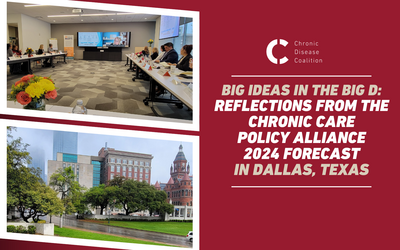
The Chronic Disease Coalition recently had the privilege of participating in the annual Chronic Care Policy Alliance Forecast — this year, hosted in Dallas, Texas.
The day started with a fascinating and important story about how patient advocacy led to breakthroughs in sickle cell advocacy. We heard firsthand accounts of the barriers that patients face in participating in research studies and finding treatments. But the recent strides made in this area underscore the power of collective action in driving meaningful change for marginalized patient populations.
The gathering served as a nexus for fellow patient advocates across the healthcare landscape, facilitating discussions on a wide array of topics shaping the future of chronic care management.
Interoperability, which allows providers to have access to treatment costs before they prescribe it, emerged as another important theme during the meeting. Last year, the CDC weighed in on a bill in Oregon that would have done just this — but it didn’t make it through the legislative process. We dissected the challenges hindering seamless data exchange among healthcare systems and brainstormed strategies to promote interoperability, ultimately aiming to enhance patient care coordination and outcomes.
A discussion on reversing insurance coverage denials shed light on the barriers patients face in accessing necessary treatments and therapies. The CCPA is embarking on a nationwide research effort to better understand how patients are navigating insurance denials and appeals processes, which will help all of us as we advocate for more streamlined utilization management practices.
The CCPA team has also recently launched a new initiative call cHope, aimed at advocating for patients struggling with one of the most common chronic conditions: obesity. By shifting the narrative around obesity and advocating for comprehensive, evidence-based interventions, we strive to mitigate its prevalence and associated health risks — including ending harmful stigmas.
As our CDC network knows, Prescription Drug Affordability Boards (PDABs) are now playing a more active role in state discussions around access to treatments. Our group spent more than an hour discussing why these are important platforms to advocate for patients, and common misperceptions about their true intent. Thanks to the team at AiArthritis for their coalition work on this issue.
Artificial intelligence (AI) has also emerged as a disruptive force with transformative potential in healthcare delivery, but the team at McKesson led an insightful and thought-provoking discussion on how to harness it for good. From predictive analytics to personalized treatment algorithms, AI holds promise in optimizing patient care processes and driving efficiencies across the healthcare continuum. However, there are many considerations patients and providers need to have when thinking about how to effectively utilize these new technologies.
The afternoon was full of conversation on issues very familiar to the CDC and our partners — Inflation Reduction Act tweaks, our collective work to pass the HELP Copays Act and the Safe Step Act, federal PBM reform, and the latest on a federal lawsuit on copay accumulators.
Beyond substantive policy discussions, the Forecast provided some great opportunities to connect in person with many of our fellow patient advocacy organizations. The synergy of all being in the same room, discussing how best to tackle big, thorny challenges, was inspiring — and sharing some classic Texas barbeque made it all the better!
As we look to the future, the Forecast served as a catalyst for renewed commitment to collaborative advocacy. By harnessing the collective strength of patient advocacy groups, we can amplify our impact and effectuate positive change in our communities and around the country. Together, we chart a course toward a more equitable, patient-centered healthcare system in 2024 and beyond.
The CDC extends our deepest thanks to the CCPA team for the tremendous event!